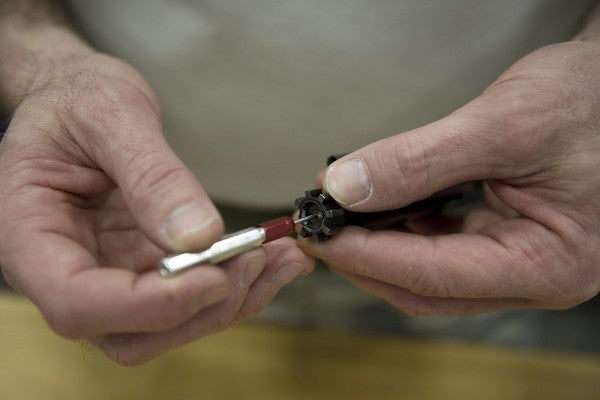UNSUNG HEROES: This Army Soldier Foiled His Friend’s Suicide Attempt With One Smart Move
In August 2008, while deployed to Iraq, 26-year-old Spc. Joe Sanders had been depressed since learning his wife wanted a...

In August 2008, while deployed to Iraq, 26-year-old Spc. Joe Sanders had been depressed since learning his wife wanted a divorce, and he’d had plenty of time to think about his troubles while pulling lonely, six-hour guard shifts. Sitting alone in his barracks room at Forward Operating Base Rustamiyah in eastern Baghdad, Sanders decided he wanted to end his own life. He grabbed his loaded M4 carbine, flicked off the safety, placed the barrel under his chin, shut his eyes, and pulled the trigger.
Nothing happened, just a light click.
Shocked and confused, Sanders immediately took apart his weapon and discovered the firing pin was missing. Just then, his roommate and friend, Spc. Albert Godding, walked into the room, and Sanders asked him where his firing pin was.
“And how did you discover it was missing?” Godding replied.
Cpl. Joe Sanders and Spc. Albert Godding pose April 27, 2010 after Godding received a Meritorious Service Medal for preventing Sanders' suicide in 2008.Photo by Zach Morgan

They both knew the answer to their own questions. Sanders had previously admitted to his friend Godding that suicide had crossed his mind. That admission and other troubling signs prompted Godding to remove the firing pin and hide it in his locker while Sanders was checking his email.
“I noticed he wasn't talking to anybody,'' Godding told long-time military reporter David Wood in a 2010 interview. “He said it had been a real bad week, that he was thinking of bad things like killing himself. I'd heard other guys talking about killing themselves, but when he said it, I knew he was serious about the whole situation.”
Sanders had come to rely on the support of his wife to help him stay strong during a 14-month combat deployment in Iraq, and news of a divorce proved too much for him to handle at that moment in his life. “To get through a lot of things that I did in Iraq, I got through because of her,” Sanders later said in an Army suicide prevention video.
Predicting that his friend would give no further warning of his suicide, Godding chose to act secretly to thwart Sanders’ attempt. “I told him I’m there for him and stuff if he needs me, but I knew he wouldn’t just say something, so I took the firing pin as a precaution,” Godding told Task & Purpose in an interview. He even informed Sanders’ immediate supervisor, to ensure no one forgot to return the firing pin before their next patrol.
Back in the barracks after Sanders’ weapon misfired, both men broke down crying upon the realization of how close Sanders’ life had come to ending, Godding put a hand on the shoulder of the friend who shared his same sense of humor and passion for guitar. “Okay, let’s go get you some help,” he said, according to Wood’s report.
In some ways, Godding’s reaction to save Sanders from the prevalent threat of suicide is similar to how he would have reacted if any friend were in need of saving during a firefight. “It does trigger the same emotions when you see the danger and want to save your buddy from it, or when you want to protect each other,” Godding told Task & Purpose. “The only difference would be it’s not like I’m choosing myself over him, you know? I think that’s the difference between reacting under fire and reacting to this. There’s nobody shooting at me to save him.”
Despite the fact that his intervention directly saved his friend’s life, Godding doesn’t see himself as a hero. “I think anybody would do that if they see the signs there to recognize it,” he told Task & Purpose. “I think anybody would have done the same thing I did.”
The Army awarded Godding a Meritorious Service Medal in 2010 for his actions, not that Godding was looking for recognition. “I didn’t need an award, I thought what I did was reward enough,” Godding was quoted in an Army news release.
After his friend’s intervention, Sanders sought help from the combat stress counselor at his base. By the time Godding received his medal, Sanders had been promoted and was newly engaged.
“Every day I wake up, I have to thank Godding,” Sanders said in the Army news release. “If it wasn’t for him I wouldn’t have gotten to experience my fiance. I wouldn’t have gotten to lead troops, or attend schools and learn. Those are things I love to do.”
Godding left the military a year ago and today works as a network operations center engineer for the communication company, ViaSat. He lives in Murrieta, California, with his wife and son.
He keeps in touch via Facebook with Sanders, who has also left the military and is now working as a nurse, according to Godding. “He’s a happy guy,” Godding told Task & Purpose.